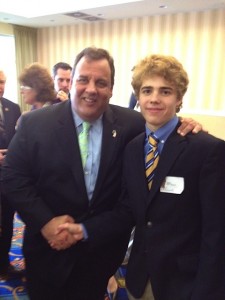 I was as disappointed as any other Republican with last Tuesday’s election results. President Obama defeated Governor Romney soundly in the Electoral College while also defeating him, albeit by a lesser margin, in the national popular vote. Republicans also lost seats in both chambers of Congress.
I was as disappointed as any other Republican with last Tuesday’s election results. President Obama defeated Governor Romney soundly in the Electoral College while also defeating him, albeit by a lesser margin, in the national popular vote. Republicans also lost seats in both chambers of Congress.
This was a pivotal election. On Tuesday, we learned that the large expansion of the federal government that took place in President Obama’s first term will likely continue without a Republican president or more conservative House or Senate to intervene. Whether Republicans like it or not, Obamacare is here to stay. The same is true of Dodd-Frank Act and many other expansions of federal power that took place under this President.
Likewise, whoever was elected president in 2012 was destined to play a major role in the budgetary reforms that are needed to bring our country to long term financial solvency and short term fiscal sanity. With President Obama, we can expect to see heavier tax hikes and military cuts and much smaller domestic spending cuts than we would have under a President Romney. Entitlement reform will be hard to achieve in any meaningful way with a President who is already on the record as opposing raising the retirement age, cutting benefits (even for the wealthy), or having any sort of market based changes within the various systems.
 The point here is that with so much on the line, my party lost big last Tuesday in an election that had huge implications for the future of public policy.
The point here is that with so much on the line, my party lost big last Tuesday in an election that had huge implications for the future of public policy.
The easy impulse is to find blame (the devastating storms, the power of incumbency, an Obama friendly media, etc.) that will relieve us from the harder (but also more rewarding) task of asking ourselves honestly where our party came up short.
What was it that made swing voters break towards President Obama instead of Governor Romney in the final days of the campaign?
Most commentators tell us that it was because Republicans came off as too extreme on social policy like immigration, abortion and other hot button social issues. These extreme positions, the argument goes, caused republicans to lose critical support from minorities, women and youth. I believe there is more than a grain of truth to what those commentators are telling us.
Most minorities don’t support Republicans because of issues like immigration but more because they are drawn to the populist economic message that Democratic Presidents typically promote. These segments of voters generally support higher taxes (on the “rich”) and more public services.
 As for social issues, I certainly think it would help the Republican Party to move towards the center —not because it is a shrewd “political tactic” but because it is more representative of the party as a whole (as opposed to a narrow but passionate bloc of the party). And, to be fair, some shift to less narrowly ideological positions is occurring already. After all, Mitt Romney was pro-choice up until a number of years ago. He revised his position, but the fact that the supposedly “militant” social conservatives still allowed him to be nominated shows a weakening of the hold they have on the party as a whole. That said, there is a paradoxical counter point indicating that a more moderate GOP on social policy wouldn’t make dramatic or even significant gains at the polls. A key connection that the GOP has with a good portion of mid-America is on social issues (along with a more hawkish foreign policy)—and that should not be threatened. I’m not saying sacrifice convictions or move opportunistically toward the “middle” but rather have a message that is more representative of the party as a whole in 2012. If that happens, there will seem to be a lurch toward the middle…but it will be accurate (not opportunistic) and help prevent the GOP from being unfairly pigeonholed as too narrow and out of step.
As for social issues, I certainly think it would help the Republican Party to move towards the center —not because it is a shrewd “political tactic” but because it is more representative of the party as a whole (as opposed to a narrow but passionate bloc of the party). And, to be fair, some shift to less narrowly ideological positions is occurring already. After all, Mitt Romney was pro-choice up until a number of years ago. He revised his position, but the fact that the supposedly “militant” social conservatives still allowed him to be nominated shows a weakening of the hold they have on the party as a whole. That said, there is a paradoxical counter point indicating that a more moderate GOP on social policy wouldn’t make dramatic or even significant gains at the polls. A key connection that the GOP has with a good portion of mid-America is on social issues (along with a more hawkish foreign policy)—and that should not be threatened. I’m not saying sacrifice convictions or move opportunistically toward the “middle” but rather have a message that is more representative of the party as a whole in 2012. If that happens, there will seem to be a lurch toward the middle…but it will be accurate (not opportunistic) and help prevent the GOP from being unfairly pigeonholed as too narrow and out of step.
The slight move to the center on hot button policy issues will help but not nearly enough. So what is the “big idea” we need to take to heart? The answer, to me, seems obvious: We failed to connect to the middle class. The modern republican movement that emerged in the 1980s succeeded most where we are now failing worst: connecting with Middle American voters. Too often, republicans have made it seem like the struggles of the middle class was of their own making. This was partially the result of Democratic messaging, but clearly Governor Romney played into the narrative by confirming this suspicion (we will be reminded by Democrats of the “47%” comment for a long time to come).
 Middle class Americans don’t believe their problems are caused by the fact that they don’t work hard enough or don’t want to succeed. They’re right not to. It not only is inaccurate but quite offensive to suggest laziness and lack of motivation is at the root of the struggles in Mid America. There are multiple economic, political, cultural and historical reasons that cause health care and energy costs to go up while middle American incomes are stagnant or falling (even as workers put in more hours a week than ever before).
Middle class Americans don’t believe their problems are caused by the fact that they don’t work hard enough or don’t want to succeed. They’re right not to. It not only is inaccurate but quite offensive to suggest laziness and lack of motivation is at the root of the struggles in Mid America. There are multiple economic, political, cultural and historical reasons that cause health care and energy costs to go up while middle American incomes are stagnant or falling (even as workers put in more hours a week than ever before).
Our party speaks often of self-reliance and individualism while accusing the Democrats of playing the “blame” game and class warfare. After all, we say, they are trying to give people a scapegoat while we ask people to take responsibility. That is an honorable position—but only so far as it is true. When our principled positions become overcharged with more forceful rhetoric we can appear to go from “advocating personal responsibility” to “finding scapegoats for our problems ourselves”—and inadvertently making that scapegoat Middle Americans who should be at our party’s core.
To be clear, this does not mean that we should abandon our small government principles. However, we need to reframe them in a way that appeals more directly to the struggling middle class. Instead of making them about self-reliance and individualism, we need to make the case that a bloated public sector has played a role in the decline of the middle class that has always made America great.
We need to make the case that middle class families are doing all they can to get ahead only to be held back by a government that taxes, spends, and regulates too much. We need to explain how excessive regulations often times help big business while squashing out small competitors, where many middle income Americans are employed. We need to reframe and rethink tax policy in a way that offers direct tax relief to the middle class while also creating a tax code more conducive to the economic growth needed to lift the middle class. This does not mean we should embrace the “taxing the rich” schemes that the other side offers. However, it does mean that we need to make sure our tax policy seems more aimed at helping the middle class than the very rich.
We need to make the case that choice and competition in health care and education has direct benefits for middle income families. In other words, we need to stop defending the status quo (big business and “the rich”) in a way that alienates the middle class, and instead refocus the case that conservative policies are superior primarily because of the benefits offered to the middle American families.
We have some reason to hope. We have leaders like Mitch McConnell, Chris Christie, and Paul Ryan who are more than capable of repackaging our message in such a way that appeals more to the middle class in the coming elections. On the other hand, it is not encouraging to see some conservative commentators blame the Obama victory on people merely wanting to be dependent on the government. Those commentators are merely reinforcing the perception of a condescending attitude toward most Americans that cause so many to not feel at home any more under the Republican tent. If that is our attitude about why we lost this election, we will be out of power for many decades to come. In a fine position to complain but not a good position to rectify.
If, on the other hand, we want to win elections during the next cycle, we must look at why we lost. And that includes honest reflection and adjustments based on lessons learned. Yes, it is a move to the “middle” (Middle America) which is related to, but different from, a move to the “center” of the policy spectrum. But that is where we are best. And where we are when we win. Until we figure out a way back to Middle America, we will have no one to blame but ourselves for future losses.









Leave a Reply